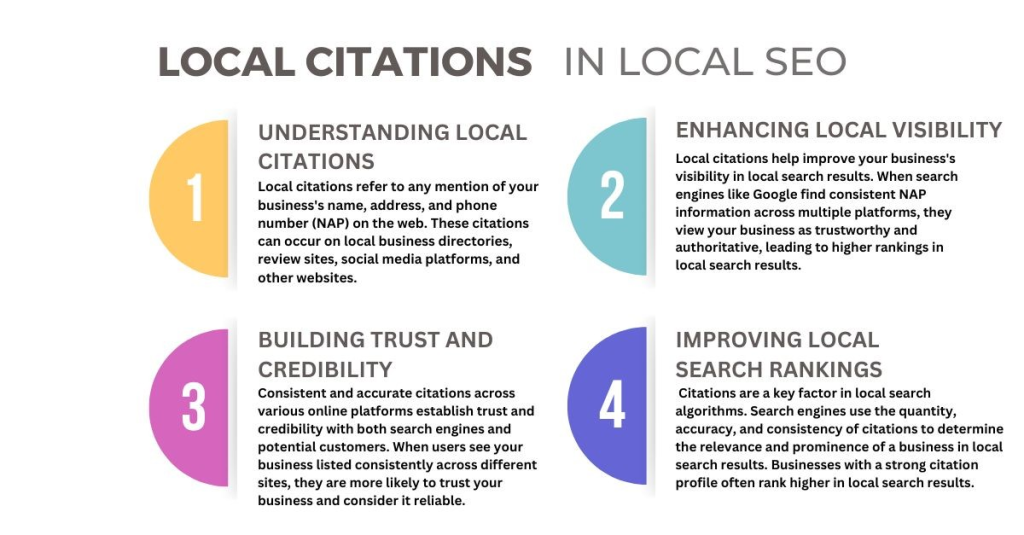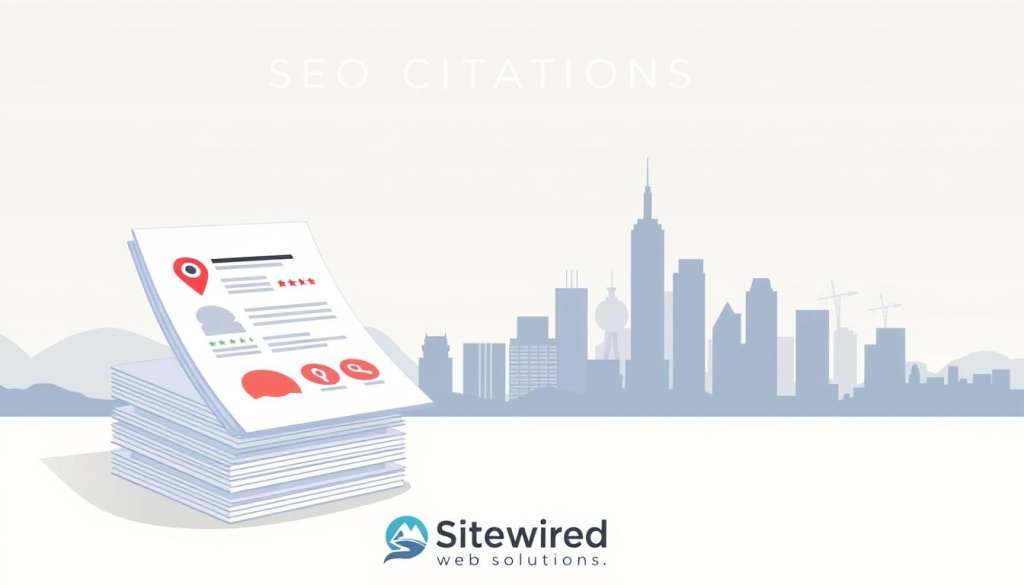Did you know businesses with optimized online profiles rank up to 18 times higher in local search results? Despite this, over 60% of companies neglect a strategy that directly impacts their visibility: managing digital references of their name, address, and phone number.

These mentions—often called citations—act like virtual breadcrumbs guiding customers to your doorstep. When your details appear consistently on directories, review sites, and industry platforms, search engines view your business as trustworthy and relevant.
A recent Google study reveals 80% of shoppers use search tools to find nearby services. Without accurate citations, you’re invisible to most of these potential clients. Even minor inconsistencies in your contact information can push your rankings down or confuse customers.
Key Takeaways
- Citations boost local search rankings by up to 18x
- Consistent business details across platforms build credibility
- 4 out of 5 consumers rely on search engines for local information
- Inaccurate listings harm visibility and customer trust
- Optimizing citations is a fast way to outrank competitors
The Basics of Local SEO and Citations
Have you ever wondered how search engines decide which local businesses to show first? The answer lies in digital references that confirm your business exists and operates where you claim. These mentions—called local citations—form the foundation of your online credibility.
What Are Local Citations?
A local citation is any online mention of your business name, address, and phone number. These appear on websites like directories, review platforms, and industry-specific sites. Consistent listings help search engines verify your location and services.
Structured vs. Unstructured Citations
Local citations come in two forms:
- Structured citations: Created intentionally on platforms like Google Business Profile or Yelp. You control the data and can update details directly.
- Unstructured citations: Appear organically on blogs, news sites, or social media. These show genuine customer interactions or media coverage.
Structured listings ensure your core information stays accurate across major directories. Unstructured mentions act like third-party endorsements, boosting trust with search algorithms. Together, they create a complete picture of your business’s reliability and community presence.
Search engines cross-reference both types to assess your relevance for local queries. Mismatched addresses or outdated phone numbers in either category can lower your rankings and confuse potential customers.
Citation Building: Key to Local SEO Success
What if your business details don’t match across the web? Search engines treat conflicting information like red flags. This mismatch makes it harder for them to verify your legitimacy. Properly managed digital references address this issue by establishing a unified online identity.

Understanding the Role of NAP Consistency
Your business name, address, and phone number (NAP) must be consistent across all online platforms. Even small variations—like “St” versus “Street”—can confuse search algorithms. A 2023 study found companies with identical NAP details get 37% more local search traffic than those with inconsistencies.
| Platform | Correct Listing | Common Errors |
|---|---|---|
| Google Business | 789 Oak St | 789 Oak Street |
| Yelp | (555) 123-4567 | 555-123-4567 |
| City: Springfield | City: Spring Field |
Building Trust and Reputation with Accurate Listings
Consistent information does more than please search engines—it reassures customers. Shoppers who find matching details on multiple sites are 68% more likely to visit your store. Inaccurate listings often lead to frustrated calls or negative reviews.
Local directories like Yellow Pages or industry-specific platforms act as trust signals. Search engines prioritize businesses listed on these authoritative sites. Regular audits ensure your information stays current as you expand or update services.
Step-by-Step Guide to Audit and Optimize Listings
How confident are you that your business details appear correctly across the web? Inconsistent listings silently sabotage your local search performance. Let’s fix that with a proven process to clean up your digital footprint.

Auditing Your Existing Citations
Start by identifying where your business appears online. Tools like Uberall scan hundreds of directories in minutes, flagging mismatched addresses or outdated phone numbers. Manual checks work too—search for your business name plus “city” to find unclaimed profiles.
Prioritize platforms with high traffic and authority. Yellow Pages and Chamber of Commerce listings matter more than obscure sites. Create a spreadsheet tracking your name, address, and phone number variations. This becomes your master reference for corrections.
Claiming and Optimizing Core Directory Listings
Google Business Profile is your first stop. Verify ownership and complete every section—photos increase engagement by 42%. Add service areas, special hours, and attributes like “wheelchair accessible.”
“Businesses with fully optimized Google profiles receive 5x more website clicks than incomplete listings.” – BrightLocal 2023 Report
Expand to industry-specific directories next. Restaurants need OpenTable, while contractors thrive on HomeAdvisor. Use our master local citation building guide for platform recommendations tailored to your niche.
Update social media bios last—they’re often overlooked. Match your Facebook “About” section with your website footer details. Consistent information builds trust with both customers and search algorithms.
Leveraging Data Aggregators and Local Directories
Data aggregators act like digital megaphones for your business details. These systems automatically share your information with hundreds of platforms, saving you hours of manual work. Three major players dominate the US market: InfoGroup (Express Update), Neustar Localeze, and Factual.
Power Up Your Reach with Aggregators
Claiming free profiles on these platforms feeds your details to GPS apps, voice assistants, and niche directories. For example:
| Aggregator | Key Partners | Update Time |
|---|---|---|
| InfoGroup | Google, Verizon | 4-6 weeks |
| Neustar | Bing, MapQuest | 2-3 weeks |
| Factual | Yelp, Uber | 3-5 weeks |
Complete every field in their submission forms. Include your exact business hours, service areas, and categories. This data becomes the source truth for countless other platforms.
Target High-Value Local Directories
Focus on industry-specific platforms after securing aggregator profiles. Electricians should prioritize Angi, while accountants target Rocket Lawyer. These specialized directories often rank higher in local searches.
Prioritize directories with:
- Domain Authority scores above 50
- Active user reviews in your city
- Mobile-friendly interfaces
Set calendar reminders to refresh your details every quarter. This prevents outdated information from spreading through aggregator networks.
Maximizing Visibility with Reviews and Social Media
Did 76% of shoppers check reviews before visiting a business last month? Customer feedback now directly shapes local search results, with search engines using reviews as trust signals. Positive ratings boost your visibility while inconsistent responses can tank rankings.
Generating and Managing Customer Reviews
Ask satisfied clients to leave feedback on Google, Yelp, or industry-specific sites. A simple “Share your experience” email converts 33% more customers into reviewers. Respond professionally to negative comments—public resolutions improve reputation and show active engagement.
Track reviews across platforms using tools like ReviewTrackers. Highlight positive testimonials on your website’s homepage or service pages. This creates a loop where great feedback attracts more customers, which generates additional reviews.
Enhancing Listings via Social Media Profiles
Optimize social media bios with identical contact details and business descriptions. Platforms like Facebook and Instagram appear in search results, acting as secondary citations. Post location-specific content weekly—events, promotions, or community spotlights.
“Social profiles rank just like web pages. A complete LinkedIn profile can outrank some company websites for branded searches.”
Google’s research shows 18% of local mobile searches lead to same-day purchases. Sync your social posts with trending local hashtags to appear in hyper-relevant searches. Engage followers with polls or questions to boost algorithmic visibility.
Regularly update cover photos and profile links to match your website’s current offers. This consistency reinforces your digital footprint across platforms, creating a unified presence that dominates local search results.
Maintaining and Updating Your Local SEO Citations
How much time does your team waste updating business details across directories? Manual management of digital references drains resources—updating one location across 35 platforms takes nearly 3 hours. For companies with 50+ locations, this becomes a full-time job requiring 4 weeks of work. Automation slashes this effort to 5 minutes while reducing human errors by 92%.
Monitoring for Consistency and Accuracy
Listing management tools like Yext or Moz Local act as central hubs. They push updates to hundreds of directories instantly. Changes to holiday hours or new service areas sync automatically, keeping your local search presence current. Real-time alerts flag mismatched addresses or duplicate listings before they impact rankings.
Monthly audits catch emerging issues. Use this checklist:
- Verify NAP consistency on top 10 industry directories
- Remove or merge duplicate profiles
- Update seasonal promotions or service changes
Search engines prioritize businesses with fresh, accurate information. A 2023 LocaliQ study found companies automating updates saw 29% more website visits within 3 months. Combine technology with quarterly manual spot-checks on niche platforms for maximum coverage.
As your business expands, standardized processes prevent breakdowns. Centralize operating hours, staff contacts, and location data in one system. This ensures every search engine listing reflects your latest offerings, building lasting trust with customers and algorithms alike.
Conclusion
Is your business truly visible to nearby customers? Developing a strong profile of local citations remains one of the fastest ways to boost your local SEO performance. Consistent listings across directories and review platforms act as digital trust signals, telling search engines your business is credible and relevant.
Businesses adding just 6 verified citations monthly often see improved search results within 4-12 months. Accurate name, address, and phone details help consumers find you faster—88% of mobile searches for local services lead to visits within 24 hours.
Regularly updating your information builds consumer confidence. Positive reviews and matching listings across platforms increase website traffic by 37% on average. This strategy costs less than paid ads while delivering lasting local search visibility.
Start today by auditing your existing profiles. Prioritize high-traffic directories and industry-specific platforms. With consistent effort, your business will dominate local searches and convert more nearby shoppers into loyal clients.

